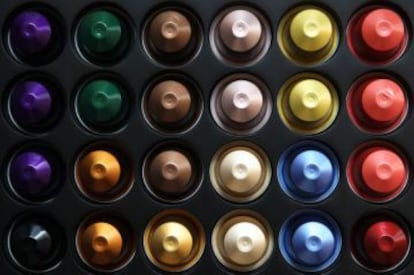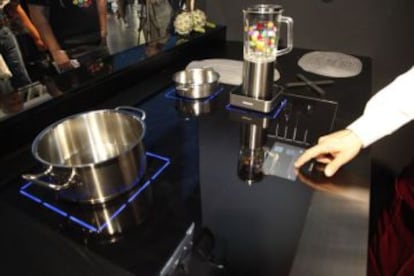Are George’s capsule coffee machines safe from germs?
A Spanish study analyzing bacteria that develop in the drip trays has had global repercussion

Everybody is aware of the importance of keeping the refrigerator clean in order to ward off harmful bacteria. Likewise, nobody would think of wiping eating utensils with a dirty dishtowel.
Yet in our heightened personal awareness about food safety, the coffee machine is the great forgotten element.
Just when the classic Italian stovetop coffee pots had been all but relegated to the museum in favor of the single-serve coffeemaker, a recent study by a Spanish research team that was published in Scientific Reports, a unit of the Nature group, has identified all the bacteria that lurk within our home and office coffee machines.
“As a society, we are always anxious to find new dangers, but the truth is that we have never had it this good, at least not in the Western world” -Team chief Manuel Porcar
This first-of-its-kind study, conducted by a team from the Cavanilles Institute for Biodiversity and Evolutionary Biology at the University of Valencia, finds that these modern appliances are home to an abundance of bacteria that come in many varieties.
In what all three researchers describe as “the first systematic analysis of coffee machine-associated bacteria,” Manuel Porcar, Alba Iglesias and Cristina Vilanova explain how they sampled the drip tray of 10 different Nespresso machines – the brand popularized by an advertising campaign starring US actor George Clooney.
“Our results reveal the existence of a varied bacterial community in all the machines sampled, and a rapid colonisation process of the coffee leach,” reads the paper, which has become one of the most-read articles from the Nature group of publications.

But not to worry, says research director Manuel Porcar.
“It is a totally safe appliance. Neither the capsules nor the coffee contain any kind of micro-organism that we were able to detect,” he notes. “The drip tray that collects the used capsules is where the contamination takes place. Despite coffee’s relatively good anti-bacterial properties, there was a large amount of micro-organisms that could be pathogens.”
Porcar adds that all one needs to do is avoid contact with the liquid that builds up in the lower tray and clean out the machine regularly, around once a week, using soap and water and even a few drops of bleach, and then round it off by washing one’s hands.
Their research work is in fact part of a line of investigation called bioprospection, which seeks unusual habitats where micro-organisms might be found and ultimately put to good use in industry and biotechnology.
“The bacterial communities described here, for the first time, are potential drivers of biotechnologically relevant processes including decaffeination and bioremediation,” reads the study.
Culturally, notes Porcar, people seem to be less concerned about the importance of keeping coffee machines clean than about other kitchen items such as dishcloths or countertops.

“We microbiologists see the world differently, and I’ve always been surprised by people who drink coffee out of those classic stovetop moka pots, which they leave on the kitchen table for a week as they take sips from it. Nobody would do that with milk. Coffee is still a relatively rich environment for the growth of micro-organisms.”
Most of the time, these tiny organisms do not inflict any harm, as our bodies are prepared for them. Only in an extreme case of poor hygiene, with the used capsule tray in a state of complete abandonment, could there be a small potential for minor digestive trouble, Porcar notes.
“But that will only happen if there is significant contact between the accumulated liquid and the coffee that one drinks.”
Although tiny, the risk serves to illustrate a larger point, says Porcar.
“Every time we handle food, it is not enough to ensure that what you eat or drink is clean; you also have to consider everything around it.”
A global impact
The fact that many people use coffee machines, coupled with the familiarity of George Clooney’s Nespresso ads, has helped this research work quickly become one of the 100 most-viewed articles out of the 120,000 same-age research papers posted by the Nature group, according to the Altmetrics measurement site.
The study has been mentioned thousands of times across the globe, including a passing mention in The New York Times.
But the researchers were prepared for the international reach of the study.
“The impact was predictable,” says Porcar, whose team has just published a similar report about bacteria on solar panels. “One of the reasons is our growing concern over what we eat. But nobody is going to die from drinking coffee. Our article warns that some bacteria are pathogens, but with normal coffee machine maintenance, problems are eliminated.”
In fact, there are no known cases of intoxication caused by coffee machine contamination.
“Any headline along the lines of ‘Researchers warn about the risk of...’ could be interpreted in many ways, and people share that on the social media,” underscores Porcar. “As a society, we are always anxious to find new dangers, but the truth is that we have never had it this good, at least not in the Western world.”
English version by Susana Urra.
Tu suscripción se está usando en otro dispositivo
¿Quieres añadir otro usuario a tu suscripción?
Si continúas leyendo en este dispositivo, no se podrá leer en el otro.
FlechaTu suscripción se está usando en otro dispositivo y solo puedes acceder a EL PAÍS desde un dispositivo a la vez.
Si quieres compartir tu cuenta, cambia tu suscripción a la modalidad Premium, así podrás añadir otro usuario. Cada uno accederá con su propia cuenta de email, lo que os permitirá personalizar vuestra experiencia en EL PAÍS.
¿Tienes una suscripción de empresa? Accede aquí para contratar más cuentas.
En el caso de no saber quién está usando tu cuenta, te recomendamos cambiar tu contraseña aquí.
Si decides continuar compartiendo tu cuenta, este mensaje se mostrará en tu dispositivo y en el de la otra persona que está usando tu cuenta de forma indefinida, afectando a tu experiencia de lectura. Puedes consultar aquí los términos y condiciones de la suscripción digital.








































